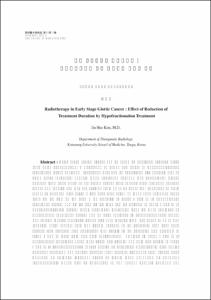초기 성문암에서 방사선치료 : 소분할조사법에 의한 치료기간 단축의 영향
- Keimyung Author(s)
- Kim, Jin Hee
- Department
- Dept. of Radiation Oncology (방사선종양학)
- Journal Title
- Keimyung Medical Journal
- Issued Date
- 2002
- Volume
- 21
- Issue
- 2
- Keyword
- Conventional fractionation; Early stage glottic cancer; Local relapse free survival; Radiation therapy; Hypofractionation
- Abstract
- Early stage glottic cancer can be cured by radiation therapy alone
with voice preservation. I undertook to study the effect of hypofractionation
treatment, which shortens treatment duration by increasing the fraction size in
early stage laryngeal cancer, when radiation therapy was performed. Thirty
patients with early stage (I, II) glottic cancer were treated with radiation therapy
alone. The median age was 62, ranging from 43 to 73 years old. According to TNM
stage, 21 patients were stage I, and nine were stage II. Mean total radiation doses
were 63 Gy and 65 Gy with 2 Gy fraction in stage I and II in conventional
treatment group, and 58 Gy and 62 Gy with 2.2 Gy fraction in stage I and II in
hypofractionation group. Mean treatment durations were 46 days (39∼51) in
conventional treatment group, and 39 days (35∼44) in hypofractionation group.
The overall median follow-up period was 51.5 months with the range of 14 to 139
months. Local control rate was 96.6% (29/30) in all patients. Five year local
relapse free survival rate (5YLRFS) was 83.3% in all patients, and 5YLRFS in
stage I and II were 90% and 70% respectively. 5YLRFS in stage I and II of
conventional treatment group were 100% and 71.4%, and 80% and 66.7% in stage
I and II of hypofractionation group, having no statistical significance. Five (16%)
patients, including one patient without local control, developed local failure after
average 14 (5∼29) months, three of whom were salvaged by curative
laryngectomy. There was no difference in the failure pattern between the conventional group and hypofractionation group. No patient suffered from above
grade 3 acute and chronic complications. Total voice preservation was observed in
26 patients (86.6%). Although the present study was carried out with a small
number of patients, there is no difference in local relapse free survival, failure
pattern and complications between conventional treatment and hypofractionation
groups which shortens the treatment time by increasing the fraction size from 2
Gy to 2.2 Gy. It is important to carry out radomized clinical study with a large
number of patients.
- Alternative Title
- Radiotherapy in
Early Stage Glottic Cancer : Effect of Reduction of
Treatment Duration by Hypofractionation Treatment
- Keimyung Author(s)(Kor)
- 김진희
- Publisher
- Keimyung University School of Medicine
- Citation
- 김진희. (2002). 초기 성문암에서 방사선치료 : 소분할조사법에 의한 치료기간 단축의 영향. Keimyung Medical Journal, 21(2), 169–176.
- Type
- Article
- Appears in Collections:
- 2. Keimyung Medical Journal (계명의대 학술지) > 2002
1. School of Medicine (의과대학) > Dept. of Radiation Oncology (방사선종양학)
- 파일 목록
-
-
Download
 21-169.pdf
기타 데이터 / 454.52 kB / Adobe PDF
21-169.pdf
기타 데이터 / 454.52 kB / Adobe PDF
-
Items in Repository are protected by copyright, with all rights reserved, unless otherwise indicated.